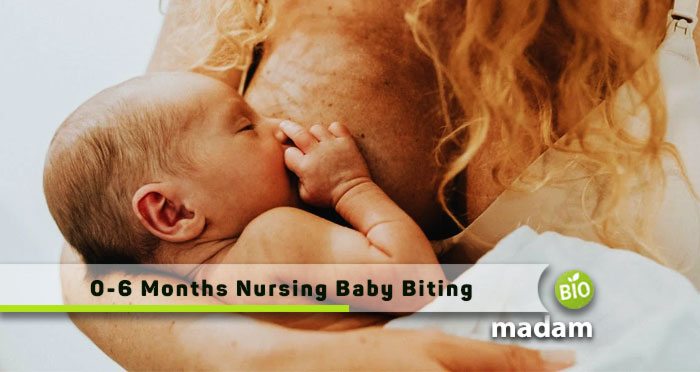Motherhood paints a canvas of shared smiles and heartwarming moments, and breastfeeding holds a special place in this masterpiece. But within this intimacy, there exists a lesser-explored chapter: the curious world of baby’s nibbles during nursing. This guide invites you into this unexpected journey, guiding you through the initial six months of your baby’s life – from their early reflexes as newborns to the exploratory phase of teething. Discover the fine balance between nurturing and nourishing, where each stage unfurls the tapestry of parental strength.
Uncover the artistry of wordless connections and the wisdom of adapting as your baby blossoms. This guide is more than managing nibbles; it’s a tribute to the captivating dance of breastfeeding’s narrative.
Understanding Nipple Biting in Newborns: 1-2 Months
During the initial months of breastfeeding, parents might encounter various challenges, and nipple biting is one of them. It’s essential to distinguish between reflexive biting and intentional biting. Newborns often have reflexes that cause them to clamp down on the nipple, but this usually diminishes as they become more accustomed to feeding.
Navigating Nipple Sensitivity: 3-4 Months
As your baby enters the 3 to 4-month mark, their awareness and exploration of their surroundings increase. This newfound curiosity can sometimes lead to more frequent nipple biting. Additionally, the emergence of teething can contribute to nipple sensitivity and discomfort. To manage this stage effectively, ensure that your baby’s latch is correct and experiment with various breastfeeding positions to reduce discomfort.
Teething Troubles and Nipple Biting: 5 Months
Around the 5-month mark, your baby’s first teeth might begin to make an appearance. Teething discomfort can cause irritability, and some babies may find relief by biting on objects, including your nipple during breastfeeding. Keep an eye out for signs of teething, such as increased drooling and gum irritation. Offering a chilled teething toy before breastfeeding can help soothe their gums and reduce the urge to bite.
Introducing Solid Foods and Nipple Biting: 6 Months
As your baby approaches the 6-month milestone, the introduction of solid foods can impact breastfeeding dynamics. The shifting dietary landscape can influence their oral motor skills and potentially affect their breastfeeding behavior. Maintain a balance between breastfeeding and introducing solids, as the two can coexist harmoniously, contributing to your baby’s overall nutrition and development.
Practical Strategies to Address Nipple Biting

- Proper Latch and Positioning: Ensuring a proper latch is crucial to preventing biting. A shallow latch might encourage biting, so make sure your baby is latched on well.
- Recognizing Feeding Cues: Babies often bite when they are not actively feeding. Watch for signs of hunger, like rooting or sucking motions, before initiating breastfeeding.
- Gentle Discipline: If your baby does bite, avoid reacting strongly. Instead, gently detach them from the breast and calmly communicate that biting is not acceptable.
- Teething Relief: Providing safe teething toys or a cold washcloth to chew on before breastfeeding can ease their discomfort and reduce the urge to bite.
How Can You Maintain a Positive Breastfeeding Experience?
Create a comfortable and relaxing breastfeeding environment to foster a positive experience for both you and your baby. Frequent feeding sessions can help prevent frustration and biting due to hunger. If nipple biting persists or becomes problematic, consider seeking guidance from a lactation consultant or healthcare professional.
Enhancing Communication and Bonding during Breastfeeding
Develop non-verbal cues with your baby to enhance communication during breastfeeding. Maintain eye contact, use soothing words, and employ gentle touch to strengthen the emotional bond. Breastfeeding is not just about nourishment; it’s a precious opportunity to connect on a deeper level with your little one.
Conclusion
The journey of breastfeeding from 0 to 6 months is an incredible one, filled with both joys and challenges. Nipple biting might be a hurdle, but armed with understanding, strategies, and patience, you can overcome it. Cherish these moments of closeness and nourishment, and don’t hesitate to seek support from fellow parents and professionals. Your dedication to nurturing your baby’s growth is a testament to the love and care you provide.

People call me Domonique Smith in Ross! I was always fond of helping people, so opted an MBBS degree to pursue my passion as my career. My major interests fall in dealing with pregnant ladies and helping them in the best of my wills for their comfort. I am further planning to choose Gynecology as my major, so wish me luck!

